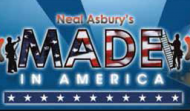
Neal Asbury began his nationally syndicated “Neal Asbury’s Made in America” show on Radio America (now on 48 stations) with some deep reservations about the NLRB getting involved in the move by Northwestern University’s football team to unionize.
Neal noted that this sounds like a move of desperation to help unions address their declining memberships.
Made in America welcomed return guest David Bego, author of “Devil At My Doorstep,” chronicling the full-scale war he was engaged in with the powerful and politically connected Service Employees International Union over unionizing Bego’s business.
“This unionization move against Northwestern seems all too familiar. First, the vote is called for on April 25 giving the university far less than the 43 days normally afforded a business to address unionization. Then they are making the student football players all kinds of promises, but neglecting to mention that players will have to pay union dues. Where do they get this money? After all, unionization is all about getting more money for the union to push their political agendas,” proposed Bego, who predicted that unionization could reduce the number of scholarships given by the university – which will come as an unpleasant surprise to many players.
Bego believes that players will recognize that they are being told a fairy tale and they will be smart enough to reject the union’s offer.
Neal segued to a discussion about the need to restore American exceptionalism and reverse the trend where many Americans consider themselves victims today, ignoring the historic American promise that if you work hard, you can accomplish anything in this country.
Taking up this topic was Sean Noble, who addressed American exceptionalism in a recent byline he penned for The National Review.
“At one time, most Americans believed that they could accomplish anything they put their mind to in this country. This really peaked under Ronald Reagan who restored a sense of optimism and patriotism. He reminded Americans about all the gifts we enjoy: freedom of speech, freedom of religion and freedom to pursue the American Dream,” noted Noble, who sees this belief slipping.
Noble related a speech he made to a grade school class, where he asked the students to raise their hands if they thought America was the greatest nation on earth. Only half the class raised their hand.
“This is all part of a new sense of entitlement that has replaced our traditional values. The new trend is to blame somebody else for your troubles. If you don’t succeed, somebody else will pick up the slack,” suggested Noble.
Neal referenced an interview he had with USA Today about the impact the volatility in Russia might have on American trade. He invited the two other sources interviewed in the article to join him on Made in America.
They were returning guest Roy Paulson, CEO of California-based Paulson Manufacturing, which produces safety equipment; and new guest Radi Al-Rashed, CEO of International Chem-Crete Co. of Dallas, which produces a product used to prevent airport runways and roads from freezing.
Neal recounted an uncomfortable conversation he once had in Saudi Arabia with a loyal customer who bought a lot of his food service products, who confessed that he had to reduce his orders because he felt pressure from Saudi officials who ordered him to reduce his purchase of American-made products.
This kind of pressure is now being felt by American exporters doing business in Russia and surrounding regions.
“There’s the said, and the ‘unsaid’ in Russia these days. There’s a chill across business relationships with American companies. It’s to the point that one of my distributors was convinced that the U.S. government was listening to our phone conversations,” related Paulson.
Radi Al-Rashed said that his dealer for Russia and Ukraine placed on hold a $432,000 order. He noted that the atmosphere in Russia is a huge concern, and he didn’t want to see it escalate.
Neal and his two guests agreed that while their companies were being treated unfairly, sanctions don’t work and are counter-productive.
“You have to keep in mind that exporters are really commercial diplomats. We bring people together, so we don’t want to see anything that will derail relationships that took years to build,” said Paulson.
Al-Rashed agreed, noting that he has been doing business in Russia since 1998, and does not want to see his business relationships come to an end. It will be hard to recover this revenue.
Made in America continued its conversation with Paulson, and added another guest: Don Ogden, chair of the National District Export Council, who advocated for accelerating our free trade agreements.
“We need to restore President Obama’s fast track negotiating authority (or Trade Promotion Authority –TPA), which gives him the authority to negotiate international agreements that the Congress can approve or disapprove. There are some free trade agreements coming up and it’s to our advantage to speed them up by giving the president the authority to complete these negotiations,” recommended Ogden.
Paulson agreed, noting that America must compete on a level playing field, which means removing the artificial trade barriers that get in the way of American exporters doing business overseas.
“People in other countries want American-made products for our unmatched quality. But we need to remove barriers, some imposed by our own government, that prevent us from getting back to work,” concluded Paulson.
Recapping the show, Neal suggested that the NLRB is opening a can of worms by taking on the Northwestern football team unionization process, which may change amateur athletics forever, and not in a good way.
Returning to the topic of American exceptionalism, Neal recounted his grandmother’s advice that if you put forth the effort you can succeed in America. Many people have lost this vision and it needs to be restored.
“What also needs to be restored is our once robust exporting superiority. We can only do this by removing the barriers established by our own government, which lays on too many regulations, too much tax, restricts access to capital and, most harmful, have lost their vision for a better America,” concluded Neal.
Each week Neal Asbury’s Made in America provides Neal’s insights into the week’s top news stories and their impact on the worlds of entrepreneurship, small business ownership and the overall economy. Neal’s analysis, together with co-host Dr. Richard Roffman, a veteran 30-year publisher with extensive domestic and international experience, takes a non-biased approach based on real life experience in business as an American manufacturer and exporter. Made in America airs nationally each Saturday from 7-8:00 PM on Radio America. Link to Made in America at http://www.nealasburysmadeinamerica.com.
APR



